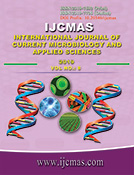


 National Academy of Agricultural Sciences (NAAS)
National Academy of Agricultural Sciences (NAAS)

|
PRINT ISSN : 2319-7692
Online ISSN : 2319-7706 Issues : 12 per year Publisher : Excellent Publishers Email : editorijcmas@gmail.com / submit@ijcmas.com Editor-in-chief: Dr.M.Prakash Index Copernicus ICV 2018: 95.39 NAAS RATING 2020: 5.38 |
Rice, the staple food crop of India contributes to ‘No Poverty’ and ‘Zero Hunger’ Sustainable Development Goals. Adoption of varieties particularly resistant to climate stress is among the most cited adaptation measures for on-farm livelihood adaptation strategies, therefore the present study was undertaken to analyse the farm-level economic impact of selected biotic and abiotic stress tolerant rice varieties, viz., Improved Samba Mahsuri (Bacterial Leaf Blight Resistant), Telangana Sona (Late sowings) and DRR Dhan 44 (Drought). Nalgonda and Mahboobnagar districts of Telangana and Karur district of Tamil Nadu were selected for the study, as these stress tolerant varieties are being popularised in these districts. An ex-post impact analysis was applied to measure the farm level economic impact of stress tolerant rice varieties. Results from the farm level survey in 2016 show that the farmers could realize a yield advantage of 12% through the yield loss averted by adoption of Improved Samba Mahsuri. The BCR for Improved Samba Mahsuri was higher (1.2) in comparison to Samba Mahsuri (1.1). The BCR of DRR Dhan 44 was 1.5, whereas for Samba Mahsuri, it was 1.3, which implies that the yield reduction due to drought was averted and the net returns were higher with the adoption of DRR Dhan 44. In order to encourage widespread adoption of stress tolerant rice varieties, dissemination activities must be accelerated. This requires proper targeting of beneficiaries in stress affected areas, complemented by training of farmers in sustainable agricultural practices.
 |
 |
 |
 |
 |